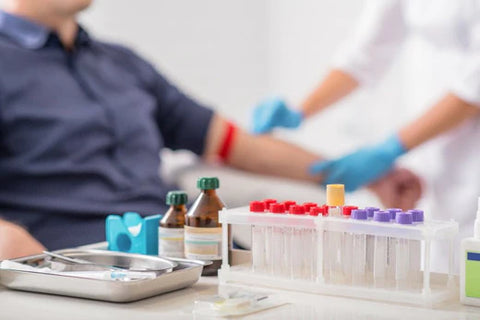Blood Tests for Diagnosing Rheumatoid Arthritis: Key Tests and CBD Benefits
Introduction
Diagnosing rheumatoid arthritis (RA) involves a combination of blood tests and clinical evaluations. This guide explores the key blood tests used to diagnose RA and highlights how CBD oil can help manage symptoms. Rheumatoid arthritis is an autoimmune disorder characterized by chronic inflammation of the joints, causing pain, swelling, and potential joint damage. Early and accurate diagnosis is crucial for effective treatment.
Understanding Rheumatoid Arthritis
Symptoms and Impact
Rheumatoid arthritis primarily affects joints, leading to pain, swelling, stiffness, and potential loss of function. Common symptoms include tender, warm, swollen joints, fatigue, fever, and weight loss. The condition can also affect other systems, including the skin, eyes, lungs, heart, and blood vessels.
Importance of Early Diagnosis
Early diagnosis and treatment can help manage symptoms, prevent joint damage, and improve quality of life. A combination of blood tests, clinical evaluations, and imaging studies are used to diagnose RA accurately.

Key Blood Tests for RA Diagnosis
Rheumatoid Factor (RF) Test
The RF test detects rheumatoid factor antibodies. High levels of RF can indicate RA, but other conditions like infections and cancers can also raise RF levels. A normal RF level is below 20 IU/mL. Elevated RF levels are found in about 80% of adults with RA. However, RF can also be positive in other autoimmune diseases and infections, so it is not specific to RA.
Anti-Cyclic Citrullinated Peptide (Anti-CCP) Test
The anti-CCP test identifies antibodies often present in RA patients. It is more specific for RA than the RF test, helping confirm the diagnosis. Anti-CCP antibodies are found in about 60-70% of people with RA and are considered highly specific markers for the disease. A positive anti-CCP test along with a positive RF test increases the likelihood of an RA diagnosis.
Erythrocyte Sedimentation Rate (ESR) Test
The ESR test measures inflammation by the rate at which red blood cells settle in a tube. Higher rates indicate inflammation but don't specify RA alone. Elevated ESR levels can be seen in various inflammatory conditions, including RA. The test helps monitor the degree of inflammation and the effectiveness of treatment over time.
Antinuclear Antibody (ANA) Test
The ANA test detects antibodies that attack the body’s own cells, commonly found in autoimmune diseases like RA and lupus. However, positive results in older adults without RA are common. While a positive ANA test is not specific to RA, it can help identify autoimmune activity and guide further testing.

Additional Diagnostic Tools
Imaging Tests
Imaging tests like X-rays and MRIs can assess joint damage and inflammation, providing a clearer picture of the extent of RA. These tests help visualize joint erosions, cartilage loss, and inflammation, aiding in the diagnosis and monitoring of RA.
Complete Blood Count (CBC)
A CBC test measures various blood components, including red and white blood cells. It helps identify anemia, which is common in RA patients. Anemia in RA is often related to chronic inflammation and can contribute to fatigue and other symptoms.
Comprehensive Diagnostic Approach
Combining Tests
Diagnosing RA accurately requires combining blood tests with clinical evaluations and imaging studies. This comprehensive approach ensures a precise diagnosis and effective treatment planning. A thorough physical examination, medical history review, and symptom assessment are essential components of the diagnostic process.
Ongoing Monitoring
Regular blood tests are essential for monitoring RA progression and treatment effectiveness. Adjustments in therapy can be made based on these test results. Continuous monitoring helps manage the disease, minimize complications, and improve patient outcomes.
Inconclusive RA blood test?
Since, as explained above, blood tests can tell a lot, but often will not tell the entire story, the diagnosis of Rheumatoid Arthritis takes into account multiple factors. These factors include a variety of blood tests, as well as the consideration of other medical factors, like genetics and physical symptoms.
In my personal case, my rheumatoid arthritis was well apparent in my blood tests (RF and anti-CCP), but sometimes, rheumatoid arthritis will not have any evidence in blood tests. This can be very deceiving and delay concrete decision-making and the decision of which treatment is the optimal one. And as we learned, any time lost in treating rheumatoid arthritis is critical since an active disease will eventually cause irreversible joint deformations.

CBD and RA Symptom Management
How CBD Helps
CBD oil can help manage RA symptoms by reducing inflammation and pain. CBD interacts with the endocannabinoid system, potentially alleviating chronic inflammation. Learn more about how CBD works. The anti-inflammatory properties of CBD can help reduce joint pain, stiffness, and swelling.
Benefits of CBD for RA
CBD’s anti-inflammatory and analgesic properties can reduce joint pain and stiffness. It also helps improve sleep quality and manage anxiety and depression associated with chronic pain. Many RA patients report significant relief from symptoms when using CBD oil as part of their treatment regimen.
Choosing the Right CBD Product
When selecting a CBD product for RA, consider full-spectrum CBD oil. Ensure the product is third-party tested for purity and potency. Broad-spectrum CBD contains multiple cannabinoids and terpenes that work together to enhance the therapeutic effects, a phenomenon known as the entourage effect.
CBD Use and Dosage
Effective Dosage
Determining the effective dosage of CBD for RA can vary among individuals. Starting with a low dose and gradually increasing it while monitoring the effects is often recommended. Consulting with a healthcare professional experienced in CBD treatment can help tailor the dosage to individual needs.
Forms of CBD
CBD is available in various forms, including oils, capsules, edibles, and topicals. For RA, topicals can be particularly effective for localized pain relief, while oils and capsules provide systemic benefits. Combining different forms of CBD can enhance overall symptom management.
FAQs
Is CBD oil effective for RA?
Yes, CBD oil can help manage RA symptoms, particularly inflammation and pain.
Can blood tests alone diagnose RA?
No, a combination of blood tests, clinical evaluations, and imaging tests is required for a definitive diagnosis.
What is the most accurate test for RA?
The anti-CCP test is more specific for RA compared to the RF test.
Is CBD oil safe for RA patients?
Yes, but consult with a healthcare provider before starting any new treatment.
Are there side effects of using CBD oil?
CBD is generally well-tolerated, but side effects can include dry mouth, dizziness, and changes in appetite.Conclusion
Blood tests play a crucial role in diagnosing rheumatoid arthritis, but they must be part of a comprehensive diagnostic approach. Combining these tests with clinical evaluations and imaging provides an accurate diagnosis. Additionally, incorporating CBD oil into your treatment plan can help manage RA symptoms effectively. Always consult with a healthcare provider to determine the best course of action for your specific needs.
